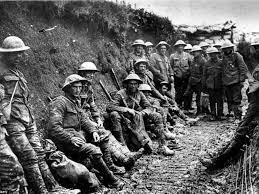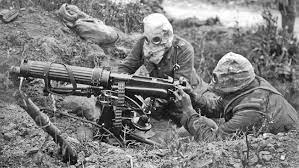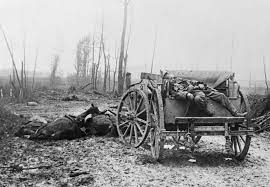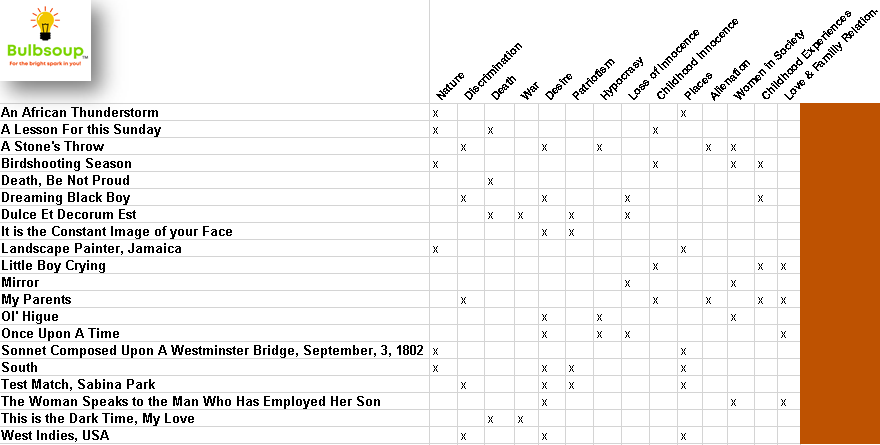Sentry Page Protection
DULCE ET DECORUM EST
|
|
Wilfred Owen, who wrote some of the best British poetry on World War I, composed nearly all of his poems in slightly over a year, from August 1917 to September 1918. In November 1918 he was killed in action at the age of 25, one week before the Armistice. (more)
|
LITERAL MEANING
Wilfred Owen, the poet, tells of his first-hand experience in war. He tells the tale of tired and wounded soldiers walking through dirt and sludge. Suddenly, there is a warning about gas, which the soldiers hurriedly and awkwardly heed by donning their helmets. Unfortunately, one soldier is too late in donning the helmet and his companions watch him 'drowning' in the gas. The unfortunate soldier (www.bulbsoup.com) was thrown in the back of a wagon, where it is implied that he was left to die. The persona points out that if you (the reader/ listener) could have witnessed these events, then you would not tell children the old lie: dulce et decorum est pro patria mori (It is sweet and honourable to die for one's country).
Wilfred Owen, the poet, tells of his first-hand experience in war. He tells the tale of tired and wounded soldiers walking through dirt and sludge. Suddenly, there is a warning about gas, which the soldiers hurriedly and awkwardly heed by donning their helmets. Unfortunately, one soldier is too late in donning the helmet and his companions watch him 'drowning' in the gas. The unfortunate soldier (www.bulbsoup.com) was thrown in the back of a wagon, where it is implied that he was left to die. The persona points out that if you (the reader/ listener) could have witnessed these events, then you would not tell children the old lie: dulce et decorum est pro patria mori (It is sweet and honourable to die for one's country).
|
3. Bent double, 1. like old beggars under sacks
Knock-kneed, 1. coughing like hags, we cursed through sludge, Till on the 4. haunting flares we turned our backs And towards our distant rest began to trudge. 5 2. Men marched asleep. 2. Many had lost their boots But limped on, blood-shod. All went lame; all blind; Drunk with fatigue; 5. deaf even to the hoots Of tired, outstripped Five-Nines that dropped behind. 10 Gas! Gas! Quick boys! - 6.An ecstasy of fumbling, Fitting the clumsy helmets just in time; But someone still was yelling out and stumbling, And 1. floundering like a man in fire or lime ... 7. Dim, through the misty panes and thick green light, 15 As under a green sea, I saw him drowning. In all my dreams, before my helpless sight, 8. He plunges at me, guttering, choking, drowning. If in some smothering dreams you too could pace 20 Behind the 9. wagon that we flung him in, 2. And watch the white eyes writhing in his face, 1. His hanging face, like a devil's sick of sin; If you could hear, at every jolt, the blood Come gargling from the froth-corrupted lungs, 25 1. Obscene as cancer, 1. bitter as the cud Of vile, incurable sores on innocent tongues,- My friend, you would not tell with such a high zest To children ardent for some desperate glory, The old Lie: 10. Dulce et decorum est 30 Pro patria mori. Poet: Wilfred Owen |
LITERARY DEVICES
1. SIMILE
|
IMPORTANT WORDS/ PHRASES
3.'Bent double' (Stanza 1, line 1)
The soldiers are bent over with fatigue. It is very significant that the poet/ persona initiates the poem by highlighting the exhaustion of the soldiers. He is trying to emphasize the harsh realities of war.
4.'haunting flares' (Stanza 1, line 3)
Flares are typically used to signal distress. The flare is fired from a flare gun, in the air, where rescue crafts, at sea or in the air, can have a general idea of the location of the soldiers who are in distress. Therefore, to describe the flares as haunting implies that the soldiers are severely distressed by their situation.
5.'deaf even to the hoots of tired, outstripped Five-Nines that dropped behind.' (Stanza 1, lines 8-9)
Five-nines are German 5.9 artillery shells. This means that bullets were firing around them while they were walking. The extent of the soldiers' tiredness is also emphasized at this point because the soldiers do not hear the shells going off around them.
6.'An ecstasy of fumbling' (Stanza 2, line 10)
The word ecstasy, which is used to describe fumbling, implies the level of panic that this one word (gas) elicits. The soldiers were so tired that they could not even hear the five nines, but this one word immediately woke them up.
7.'Dim, through the misty panes and thick green light, as under a green sea, I saw him drowning.' (Stanza 2, lines 14-15)
This describes exactly what (www.bulbsoup.com) the outside world looks like through the lens of a gas mask. The effect of the gas is seen in the mention of the word 'drown'. It implies that the unfortunate soldier could not breathe.
8. 'He plunges at me, guttering, choking, drowning.' (Stanza 3, line 17)
This is the very graphic result of breathing in the gas. It is a very violent reaction, as seen in the word 'plunge'. The dying soldier did not simply reach for the persona/poet, but he did so in a desperate manner, while all the time being unable to breathe.
9.'wagon that we flung him in' (Stanza 4, line 20)
The statement implies that the soldier was left for dead in a wagon. No regard was shown to him, through the use of the word 'flung'. This implies that war is heartless and tragic.
10.'Dulce et decorum est pro patria mori.' (Stanza 4, lines 29-30)
This statement literally means it is sweet and honourable to die for one's country. The persona/ poet clearly does NOT believe this to be the case.
3.'Bent double' (Stanza 1, line 1)
The soldiers are bent over with fatigue. It is very significant that the poet/ persona initiates the poem by highlighting the exhaustion of the soldiers. He is trying to emphasize the harsh realities of war.
4.'haunting flares' (Stanza 1, line 3)
Flares are typically used to signal distress. The flare is fired from a flare gun, in the air, where rescue crafts, at sea or in the air, can have a general idea of the location of the soldiers who are in distress. Therefore, to describe the flares as haunting implies that the soldiers are severely distressed by their situation.
5.'deaf even to the hoots of tired, outstripped Five-Nines that dropped behind.' (Stanza 1, lines 8-9)
Five-nines are German 5.9 artillery shells. This means that bullets were firing around them while they were walking. The extent of the soldiers' tiredness is also emphasized at this point because the soldiers do not hear the shells going off around them.
6.'An ecstasy of fumbling' (Stanza 2, line 10)
The word ecstasy, which is used to describe fumbling, implies the level of panic that this one word (gas) elicits. The soldiers were so tired that they could not even hear the five nines, but this one word immediately woke them up.
7.'Dim, through the misty panes and thick green light, as under a green sea, I saw him drowning.' (Stanza 2, lines 14-15)
This describes exactly what (www.bulbsoup.com) the outside world looks like through the lens of a gas mask. The effect of the gas is seen in the mention of the word 'drown'. It implies that the unfortunate soldier could not breathe.
8. 'He plunges at me, guttering, choking, drowning.' (Stanza 3, line 17)
This is the very graphic result of breathing in the gas. It is a very violent reaction, as seen in the word 'plunge'. The dying soldier did not simply reach for the persona/poet, but he did so in a desperate manner, while all the time being unable to breathe.
9.'wagon that we flung him in' (Stanza 4, line 20)
The statement implies that the soldier was left for dead in a wagon. No regard was shown to him, through the use of the word 'flung'. This implies that war is heartless and tragic.
10.'Dulce et decorum est pro patria mori.' (Stanza 4, lines 29-30)
This statement literally means it is sweet and honourable to die for one's country. The persona/ poet clearly does NOT believe this to be the case.
THEMATIC CATEGORIZATION: Death, War, Patriotism, Loss of Innocence
ATMOSPHERE
- The mood of the poem is one of anger. The persona/ poet is thinking about his experiences in the war.
- The general tone of the poem is both sarcastic and ironic. The persona/ poet tries to present a visual of the realities of war while using the haunting words that contradict that reality. It is, in fact, NOT sweet and honourable to die for one's country.
Contributor: Leisa Samuels-Thomas
Owen, W. 'Dulce Et Decorum Est' in A World of Poetry. Edited by Mark McWatt and Hazel Simmonds McDonald. Pearson Education Ltd, 2005.
Owen, W. 'Dulce Et Decorum Est' in A World of Poetry. Edited by Mark McWatt and Hazel Simmonds McDonald. Pearson Education Ltd, 2005.








